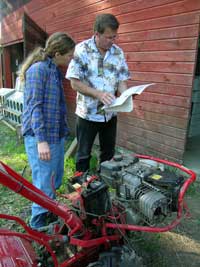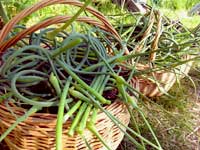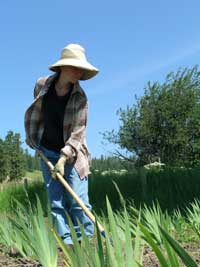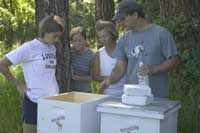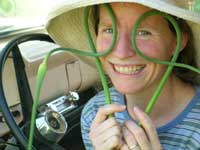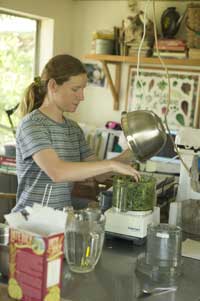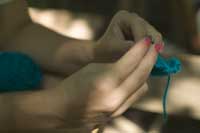

|
|
2006 Schedule July 30th – August 5th
Cost: $2,950
Course Descriptions Organic Cooking
Learn how to cook easy, healthy meals for friends and family. Start by learning to identify what is in season and utilizing fresh produce. This workshop will teach basic kitchen skills, and you will learn how to make a one-skillet meal. The workshop will also introduce you to our newest product, ChillOver Powder, and show you how to make a delicious new dessert. Course outline:
Organic Gardening In North America, the average distance that food travels to get from where it is grown to where it is eaten is 1,300 miles. That means the produce in our stores is several days old by the time that you purchase it. Imagine being able to walk out your back door and pick fresh produce to feed your family. In this workshop, we will be addressing how to grow fresh, healthy food for you and your family without the use of harmful pesticides. Course outline:
Seed Saving Seeds may be inexpensive to buy, but they are even cheaper when you save them. The heart of your food is your seeds. You will learn how to harvest and save seeds that are healthy and disease-free. Course outline:
Food Preservation
Enjoy the fruits of your labor year-round. You will learn various methods of putting up your produce, such as canning, freezing, and dehydrating. We will also talk about root cellars. Course outline:
Budgeting
Have you ever felt like there was too much month left at the end of your paycheck? This course will discuss low-cost living, living on your income, and the difficulty of sticking with simple living when the world around us is promoting consumerism. Course outline:
Chopping Firewood Tackling a brawny job with some female ingenuity. We will introduce you to techniques that will make this chore easier. Course outline:
Composting
Healthy soil is important to your garden’s health. Composting is an easy, organic way of achieving that goal. This workshop will address different types of composting and the uses of compost. Course outline:
Marketing Your Farm
Do you feel like your business is standing still? Do you want to know how to reach others with your products? This workshop will address ways that you can promote your farm. Course outline:
Biofuels
*This course will also be offered as a one-day course and includes lunch and dinner. The cost: $300 Tired of our dependence on foreign fuels? Raising your own fuels may be an alternative. This course will show steps to help you through a fossil fuel withdrawal. You will learn the benefits of biofuels and their by-products. Course outline: Farm Animals
Are you looking to expand your farm with animals? Some animals are manageable on small plots, and this workshop will address them. You will be able to experience first-hand the joys of farm animals. Course outline:
Building a Wall Tent/Starting a Bed & Breakfast Value-added products are encouraged by the U.S. Department of Agriculture. Agri-tourism is very popular overseas, and is building up momentum in the United States. Offering a bed and breakfast is a simple way of introducing others to the farming life. We will show you how we started a B&B in wall tents and how you could do the same on any piece of land. Course outline:
Community Gardens
The Palouse-Clearwater Environmental Institute (PCEI) is a local organization committed to increasing citizen involvement in decisions that affect our region’s environment through community organizing and education. PCEI’s Community Agriculture program runs our community garden with plots rented by local people. Community gardens help to support family farmers and fulfill local citizens’ food and fiber needs. During this workshop, you will be given a tour of PCEI’s “ranch” and local community gardens. Course outline:
Organic Certification
In order to be a certified organic grower, you need to meet certain standards mandated by the state and federal government. This course walks you through the steps of receiving your certification, from the time you decide you want to be certified to the inspection. Course outline: · So you want to be certified
Greenhouses Greenhouses have been around since 30 A.D., and their appeal has not diminished. This course will address questions you may have about growing produce in a greenhouse year-round and discuss various types of greenhouses. Course outline:
Tool Maintenance Proper maintenance of your gardening tools will extend their usefulness and save you a bit of elbow grease. Course outline:
Sustainable Landscaping Landscaping is more than just a tree or a shrub plopped in the ground. A Money Magazine survey found that landscaping as a home improvement project has a recovery value of 100-200% if the landscaping is well done. But who says that landscaping is just shrubs and flowers? This workshop will introduce you to some great landscaping ideas. A tour of Potting Shed Creations of Troy, Idaho, is also included in the day. Course outline:
Learning to Knit/Crochet
Knitting and crocheting is no longer just for grandmothers, they have become the hip activities of all ages. Learn the domestic arts of knitting and crocheting, starting with a tour of an alpaca farm to learn about the production of wool. Followed up with an easy project that you finish at home. Course outline:
Treadle Sewing
Let your happy feet help you make a sewing project. Learn to make a simple apron on an old-fashioned treadle machine. Course outline:
Sample Daily Schedule Monday
Tuesday
Wednesday
Thursday
Friday
Saturday
|
Read a Pay Dirt Farm School student's Farm Journal from his stay at MaryJanesFarm in July 2003.
